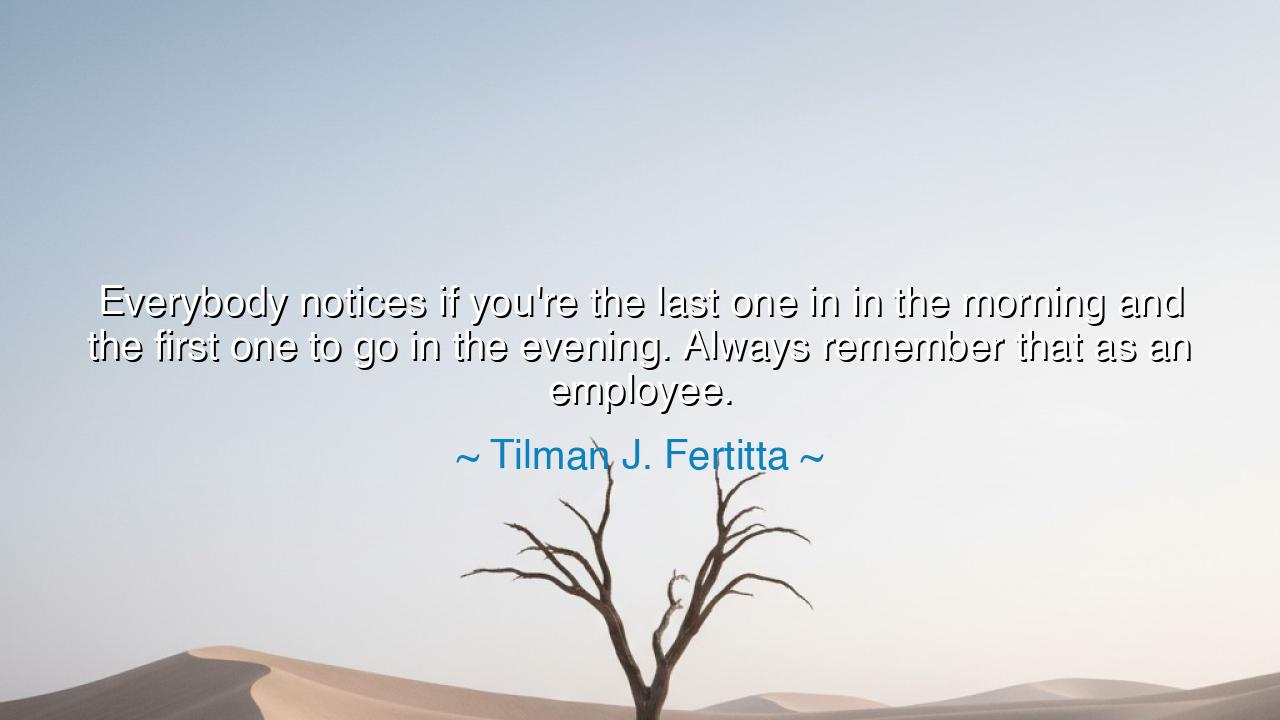
Everybody notices if you're the last one in in the morning and
Everybody notices if you're the last one in in the morning and the first one to go in the evening. Always remember that as an employee.






"Everybody notices if you're the last one in in the morning and the first one to go in the evening. Always remember that as an employee." — Tilman J. Fertitta. These words, spoken by Tilman J. Fertitta, carry the weight of a profound truth that resonates through the ages. They speak of the value of commitment, discipline, and consistency. To be the first to rise and the last to leave, to be steadfast in your duties, and to put in the time, is not merely about physical presence—it's about showing dedication, about leaving a mark that is noticed by those around you. This is not a call for mere obedience; it is a call for excellence, a reminder that true success lies in the small but significant details that others often overlook.
In the ancient world, the idea of work ethic and discipline was revered as a hallmark of virtue. The Spartans, known for their rigorous training and commitment to duty, would never have considered leaving the training ground before their work was done. The discipline they showed, whether in their military training or in their daily tasks, was a reflection of their character. They understood that how one showed up to their task—whether they were the first to arrive or the last to leave—was a reflection of their commitment to both the work and the community. Similarly, Fertitta’s words reflect the ancient wisdom that we are defined not just by our actions, but by the consistency and devotion with which we perform them.
Consider the great Roman general Gaius Marius, whose rise to power was marked by his unrelenting work ethic. Known for his military reforms, Marius made it a habit to be among the first to arrive and the last to leave the training grounds. His soldiers saw him as a leader who led by example, not by command alone. His physical presence on the field—his commitment to discipline—inspired loyalty and respect among his troops. Marius knew that true leadership was not just about commanding others, but about showing the way through hard work and sacrifice. The lesson here is clear: by being present, by giving more of ourselves, we inspire others to do the same. Just as Fertitta reminds us, commitment and discipline are what set us apart in the eyes of those around us.
In the same vein, Marcus Aurelius, the Stoic emperor, demonstrated the importance of dedication in leadership. His reign was filled with war and political turmoil, yet he was always known to be a ruler who understood the importance of diligence. His writings in Meditations reveal his commitment not just to his empire but to his personal development. He often reflected on the value of discipline and the importance of being present in every moment, no matter how taxing the day might have been. His leadership was not just about ruling from a throne—it was about embodying the principles of hard work and service. Like Fertitta’s advice, Aurelius understood that true leadership requires not just authority but also consistency and presence.
In our own lives, whether in our work, studies, or personal endeavors, we are called to show up with commitment and integrity. Fertitta’s words are a powerful reminder that how we approach our duties—whether in our professional lives or personal relationships—matters greatly. It is easy to fall into the trap of doing the bare minimum, of leaving when the clock strikes the end of the day. But true greatness is found in the extra mile we walk, in the diligence and devotion we show when no one is looking. It is in being the first to rise, the last to leave, and in finding satisfaction in the work itself, not just the reward.
The lesson is simple but profound: discipline and dedication set the foundation for success in any arena of life. Like the ancient warriors, like Marius and Aurelius, we must demonstrate our commitment through consistent effort, through showing up day after day, even when the work seems endless or unnoticed. The world may not always immediately reward our extra effort, but our character and reputation are forged in the quiet hours, in the moments when we give more of ourselves than is required. Fertitta’s reminder is a call to rise above mediocrity, to be the leader not just by position but by example.
So, as you embark upon your own daily tasks, whether in your work or personal life, remember Fertitta’s words. Let your actions speak louder than your words, let your commitment shine through in the details. Whether in the office, the home, or the community, be the one who rises early and stays late, not because you are seeking recognition, but because your integrity, your discipline, and your dedication will be the mark by which others remember you. By embracing this spirit, you shape not only your destiny but the legacy you leave behind.






AAdministratorAdministrator
Welcome, honored guests. Please leave a comment, we will respond soon